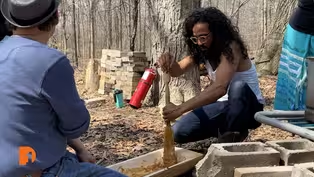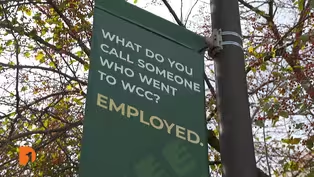
Family Caregivers Month with the Area Agency on Aging 1-B
Clip: Season 8 Episode 22 | 8m 5sVideo has Closed Captions
The Area Agency on Aging 1-B talks about the resources and support for family caregivers.
November is National Family Caregivers Month. Stephen Henderson talks with Julie Lowenthal of Area Agency on Aging 1-B about the importance of support services and resources for family caregivers who aren't paid and often neglect their own health and well-being while caring for others. Plus, they explore possible legislative policies that would ease the burdens faced by family caregivers.
Problems playing video? | Closed Captioning Feedback
Problems playing video? | Closed Captioning Feedback
One Detroit is a local public television program presented by Detroit PBS

Family Caregivers Month with the Area Agency on Aging 1-B
Clip: Season 8 Episode 22 | 8m 5sVideo has Closed Captions
November is National Family Caregivers Month. Stephen Henderson talks with Julie Lowenthal of Area Agency on Aging 1-B about the importance of support services and resources for family caregivers who aren't paid and often neglect their own health and well-being while caring for others. Plus, they explore possible legislative policies that would ease the burdens faced by family caregivers.
Problems playing video? | Closed Captioning Feedback
How to Watch One Detroit
One Detroit is available to stream on pbs.org and the free PBS App, available on iPhone, Apple TV, Android TV, Android smartphones, Amazon Fire TV, Amazon Fire Tablet, Roku, Samsung Smart TV, and Vizio.
Providing Support for PBS.org
Learn Moreabout PBS online sponsorship[MUSIC] [MUSIC] >> this is a really important topic right now.
it's a really pressing topic in so many people's lives.
and the way we think about caregiving and caregivers seems like it's changing quite a bit.
i think we're understanding more a bow.
what caregiving is and how crucial it is.
and we're really expanding the way we think about who is a caregiver and what support they need.
it is national caregivers months.
so so tell us where you think we are about the months that that brings the focus to this issue.
>> that's a great question.
so currently in the united states is actually forty eight million unpaid family caregivers and actually michigan.
there's one point seven million michiganders to our family caregivers.
twenty-one percent of all caregivers have reported that this had being a caregiver is actually impacted their own personal help health and wellness.
and there's actually a new statistic that just came out that sixty six hundred billion dollars is how much caregivers are doing towards unpaid care in the united states.
he really and that's the number that most people are unaware asked.
yeah.
>> i want to talk about specifically our defining those terms because they said i think they're growing their expanding a really important and healthy way.
when you say caregiver, give me some examples of of we're thinking up.
>> so family caregivers are anyone who is on being unpaid.
so they're not professional caregiver, but they're being unpaid, provide care to their loved one.
this can be someone who's doing it from a distance.
so caring for a parent that's out of state.
and just, you know, flying in a couple times a week or couple times months, it could be someone who's just handling financial things for their loved one or it could be someone he's doing everyday hands on and care like bathing in housing and, you know, everything from transferring in and out of bed and then wheelchairs, etcetera.
>> yeah.
and i think one way to think about this is a we all i think at some point become caregivers.
i can't think of anyone i know in fact is not in a in one of those categories are situations that some planned their life.
and i think it's probably safe to say that at some point we will all need caregiving, you know, at some point in our in our lives, this really is that really does get to the universality.
i think of of this issue.
it's not certain people are some places.
it's all of us.
>> a hundred percent.
and actually the baby boomer generation, which is one of our largest generations, is that generation that very shortly is going to need to be cared for.
and that is something that us and the aging network are working very hard to make sure that there are resources available to that generation.
>> yeah, so so i want to talk about some of the things that you find a yourselves doing at area agency on aging.
and you our guys there now called region one, be a talk about what that means to support caregivers.
>> of course, i'm so quick thing in southeast michigan.
there are actually three area agencies on aging.
i see one b's serves all of the it basically see around wake county.
so we serve all of the counties.
but wayne and then in wayne county, there are two agencies, the senior lions and then d triple a which is detroit area agency on aging one aging.
it's so and then there are plenty of programs and services out there for caregivers.
there's actually been a huge national push just last year.
a federal government released.
you know what, bunch of funding things as well as a catalog up how we can help a family caregivers within our nation at our agency.
one, we have many wonderful programs and resources available to caregivers and they can always find that information on our website.
but they i would like to highlight a few of those programs that are dear to us to caregivers.
december nine am we're offering a caregiver partners passage through dementia workshop.
and this will be a day-long workshop.
a workshop that helps caregivers gain knowledge, skills, information and tools needed to take charge of their role as that caregiver, especially that caregiver caring for someone with dementia.
we also offer a powerful tools for caregiving course, which is a six-week educational program designed to help caregivers take care of themselves while caring for a relative, a relative or a friend.
and then most recently, we actually lot launched a caregiver respite voucher program, which will provide short-term respite care for informal family, caregivers, of older adults.
and what we found is that access to respite care could help reduce character stress, apply kicker, burnout and also the to better outcomes.
and underneath that specific initiative, caregivers are going to be able to receive up to five hundred and seventy-five dollars towards in-home respite care.
>> yeah.
what kinds of things do you feel?
we need to change from a legislative a policy perspective to make this all easier for folks?
i mean, as you point out, there's this uncompensated care is is something that that many, many families are dealing with, the stress and the burdens of that are are not small.
what kinds of changes would you like to see that would that would ease some of the apps for those of us who are caregiving?
>> well, for one, a caregiver tax credit, i think would really help caregivers, especially those that don't qualify for state or federal funding that just to help alleviate some of that personal financial burden.
also workplace initiatives to allow care evers to take that fmla so that they are able to care for their loved one without the risk of losing their position after work, fifty percent of caregivers to work full time, adding that workplace initiatives in it in place could really help those people.
>> a lot of times when we're talking about caregiving, we're talking about we're talking about end of life or or late in life care.
and i think that the word dignity comes up a lot.
how we think about that, how we define it, not just the people who are receiving care, but also for the ones who are giving.
and i want to give you just the little opportunity to talk about what big monday means in this context and how we make sure our that that dignity is something that defines this experience for people.
>> dignity it can be seen, especially for our aging population is one to not discount them.
even when they are may be showing signs of alzheimer's and dementia.
they still are capable of making decisions based off of what they want.
so making sure that their voices are being heard.
Native American Heritage Month: Michigan indigenous history
Video has Closed Captions
Clip: S8 Ep22 | 6m 31s | Native American Heritage Month serves a as reminder of Michigan’s indigenous history. (6m 31s)
One Detroit Weekend: December 1, 2023
Video has Closed Captions
Clip: S8 Ep22 | 1m 51s | Here are eight winter-themed events to check out around Southeast Michigan this weekend. (1m 51s)
Washtenaw College battles brain drain with new FAME program
Video has Closed Captions
Clip: S8 Ep22 | 5m 38s | Brain drain: Washtenaw Community College’s FAME program connects students to careers. (5m 38s)
Providing Support for PBS.org
Learn Moreabout PBS online sponsorship
- News and Public Affairs

Top journalists deliver compelling original analysis of the hour's headlines.

- News and Public Affairs

FRONTLINE is investigative journalism that questions, explains and changes our world.












Support for PBS provided by:
One Detroit is a local public television program presented by Detroit PBS


